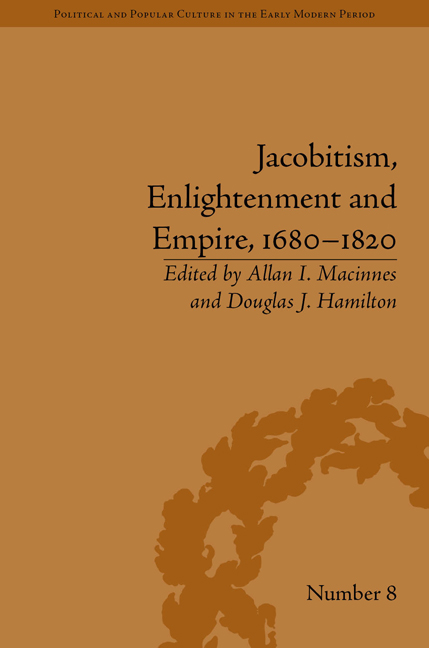Book contents
- Frontmatter
- CONTENTS
- List of Contributors
- List of Tables
- Introduction: Identity, Mobility and Competing Patriotisms
- 1 Jamie the Soldier and the Jacobite Military Threat, 1706–27
- 2 Simply a Jacobite Heroine? The Life Experience of Margaret, Lady Nairne (1673–1747)
- 3 Missionaries or Soldiers for the Jacobite Cause? The Conflict of Loyalties for Scottish Catholic Clergy
- 4 English Liturgy and Scottish Identity: The Case of James Greenshields
- 5 ‘Let Him be an Englishman’: Irish and Scottish Clergy in the Caribbean Church of England, 1610–1720
- 6 Scotland, the Dutch Republic and the Union: Commerce and Cosmopolitanism
- 7 Clearing the Smokescreen of Early Scottish Mercantile Identity: From Leeward Sugar Plantations to Scottish Country Estates c. 1680–1730
- 8 Union, Empire and Global Adventuring with a Jacobite Twist
- 9 John Drummond of Quarrel: East India Patronage and Jacobite Assimilation, 1720–80
- 10 William Playfair (1759–1823), Scottish Enlightenment from Below?
- 11 The Visionary Voyages of Robert Burns
- 12 ‘Defending the Colonies against Malicious Attacks of Philanthropy’: Scottish Campaigns against the Abolitions of the Slave Trade and Slavery
- Abbreviations
- Notes
- Index
10 - William Playfair (1759–1823), Scottish Enlightenment from Below?
- Frontmatter
- CONTENTS
- List of Contributors
- List of Tables
- Introduction: Identity, Mobility and Competing Patriotisms
- 1 Jamie the Soldier and the Jacobite Military Threat, 1706–27
- 2 Simply a Jacobite Heroine? The Life Experience of Margaret, Lady Nairne (1673–1747)
- 3 Missionaries or Soldiers for the Jacobite Cause? The Conflict of Loyalties for Scottish Catholic Clergy
- 4 English Liturgy and Scottish Identity: The Case of James Greenshields
- 5 ‘Let Him be an Englishman’: Irish and Scottish Clergy in the Caribbean Church of England, 1610–1720
- 6 Scotland, the Dutch Republic and the Union: Commerce and Cosmopolitanism
- 7 Clearing the Smokescreen of Early Scottish Mercantile Identity: From Leeward Sugar Plantations to Scottish Country Estates c. 1680–1730
- 8 Union, Empire and Global Adventuring with a Jacobite Twist
- 9 John Drummond of Quarrel: East India Patronage and Jacobite Assimilation, 1720–80
- 10 William Playfair (1759–1823), Scottish Enlightenment from Below?
- 11 The Visionary Voyages of Robert Burns
- 12 ‘Defending the Colonies against Malicious Attacks of Philanthropy’: Scottish Campaigns against the Abolitions of the Slave Trade and Slavery
- Abbreviations
- Notes
- Index
Summary
A striking illustration of the difficulties in assessing William Playfair's awkward course in enlightened Europe can be found in Robert Chambers's Biographical Dictionary of Eminent Scotsmen (1835). In the opening lines of the article devoted to him, it is stated that:
The personal history of this man when compared with that of his brother, shows in striking colours the necessity, not only of industry, but of steadiness and consistency of plan, as adjuncts of genius in raising its possessor to eminence.
Indeed, when compared with his elder brother John, eminent member of the literati, renowned Professor of Mathematics, then of Natural Philosophy, at the University of Edinburgh, William Playfair does not conform to the traditional image of an eminent Scotsman in any respect. Playfair was a restless entrepreneur, an engineer, an inventor of statistical graphics, a theoretician of political economy, a ‘miscellaneous writer’ and editor; but he was also a swindler, a blackmailer and a bankrupt. Operating across the Channel between the 1780s and the 1820s, he died in poverty and relative obscurity in 1823, banned from any ‘good society’, while his elder brother was commemorated with a mausoleum on Calton Hill.
How could such a ‘blunderer’, a ‘daring worthless fellow’, be of any interest other than as an incidental figure in the literary and intellectual ‘underworld’ in Britain and France at the time of the French Revolution? Why allocate him a seat (albeit an inferior one) in the Scottish pantheon, as Chambers did years after Playfair's death?
- Type
- Chapter
- Information
- Jacobitism, Enlightenment and Empire, 1680–1820 , pp. 159 - 172Publisher: Pickering & ChattoFirst published in: 2014



